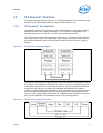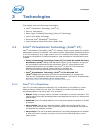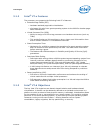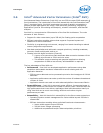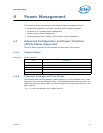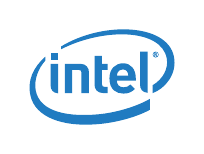
Technologies
24 Datasheet
3.1.3.1 Intel
®
VT-d Features Supported
The processor supports the following Intel VT-d features:
• Root entry, context entry, and default context
• Support for 4-K page sizes only
• Support for register-based fault recording only (for single entry only) and support
for MSI interrupts for faults
— Support for fault collapsing based on Requester ID
• Support for both leaf and non-leaf caching
• Support for boot protection of default page table
— Support for non-caching of invalid page table entries
• Support for hardware based flushing of translated but pending writes and pending
reads upon IOTLB invalidation
• Support for page-selective IOTLB invalidation
• Support for ARI (Alternative Requester ID – a PCI SIG ECR for increasing the
function number count in a PCIe* device) to support I/O Virtualization (IOV)
devices
• Improved invalidation architecture
• End point caching support (ATS)
• Interrupt remapping
3.1.4 Intel
®
Virtualization Technology Processor Extensions
The processor supports the following Intel VT processor extension features:
• Large Intel VT-d Pages
— Adds 2MB and 1GB page sizes to Intel VT-d implementations
— Matches current support for Extended Page Tables (EPT)
— Ability to share processor EPT page-table (with super-pages) with Intel VT-d
— Benefits:
• Less memory foot-print for I/O page-tables when using super-pages
• Potential for improved performance – due to shorter page-walks, allows
hardware optimization for IOTLB
• Transition latency reductions expected to improve virtualization performance
without the need for VMM enabling. This reduces the VMM overheads further and
increase virtualization performance.






